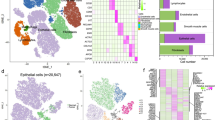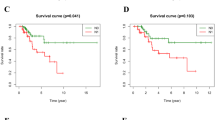Abstract
Cervical cancer remains the leading cause of cancer-related mortality among female reproductive malignancies, and lymph node metastasis (LNM) represents the major reason for its poor prognosis. In this study, we aimed to identify transcriptome differences in patients with cervical squamous cell carcinoma (CSCC) who developed LNM or not and to outline the function of GLIS1 in determining metastatic fate in CSCC. In The Cancer Genome Atlas-endocervical adenocarcinoma project, patients with LNM had shorter overall survival than those without. Transcriptome data from CSCC patients with and without LNM were analyzed to screen for differentially expressed genes (DEGs). DEGs were enriched in metastasis-related pathways, such as extracellular matrix organization, cell-cell adhesion, and regulation of tissue remodeling. GLIS1 was overexpressed in tumor tissues of patients with LNM. COMP and ITGA11 were screened as downstream targets of GLIS1. GLIS1 promoted their transcription by binding to the promoter regions of COMP and ITGA11. GLIS1 enhanced the migration, invasion, and epithelial-mesenchymal transition in CSCC cells, while the knockdown of COMP or ITGA11 reversed the promotion of GLIS1 on CSCC cell malignant phenotype. Together, our results demonstrate that GLIS1 might be related to the LNM of CSCC patients via COMP and ITGA11.
Graphical Abstract






Similar content being viewed by others
Data Availability
The data for this study are available by contacting the corresponding author upon reasonable request.
Code Availability
Not applicable.
References
Li H, Wu X, Cheng X. Advances in diagnosis and treatment of metastatic cervical cancer. J Gynecol Oncol. 2016;27(4):e43.
Small W Jr, Bacon MA, Bajaj A, Chuang LT, Fisher BJ, Harkenrider MM, et al. Cervical cancer: a global health crisis. Cancer. 2017;123(13):2404–12.
Saleh M, Virarkar M, Javadi S, Elsherif SB, de Castro FS, Bhosale P. Cervical cancer: 2018 Revised International Federation of Gynecology and Obstetrics Staging System and the Role of Imaging. AJR Am J Roentgenol. 2020;214(5):1182–95.
Kapoor C, Vaidya S, Wadhwan V, Malik S. Lymph node metastasis: a bearing on prognosis in squamous cell carcinoma. Indian J Cancer. 2015;52(3):417–24.
Guo Q, Wu Y, Wen H, Ju X, Wu X. Effect of the number of removed lymph nodes on survival in patients with FIGO stage IB-IIA cervical squamous cell carcinoma following open radical hysterectomy with pelvic lymphadenectomy: a retrospective cohort study. J Oncol. 2021;2021:6201634.
Casamassimi A, Federico A, Rienzo M, Esposito S, Ciccodicola A. Transcriptome profiling in human diseases: new advances and perspectives. Int J Mol Sci. 2017;18(8):1652.
Chen F, Fan Y, Cao P, Liu B, Hou J, Zhang B, et al. Pan-cancer analysis of the prognostic and immunological role of HSF1: a potential target for survival and immunotherapy. Oxid Med Cell Longev. 2021;2021:5551036.
Wen X, Liu S, Cui M. Effect of BRCA1 on the concurrent chemoradiotherapy resistance of cervical squamous cell carcinoma based on transcriptome sequencing analysis. Biomed Res Int. 2020;2020:3598417.
Zuo Z, Xiong J, Zeng C, Jiang Y, Xiong K, Tao H, et al. Exploration of a robust and prognostic immune related gene signature for cervical squamous cell carcinoma. Front Mol Biosci. 2021;8:625470.
Jiang Y, Chen S. Functional new transcription factors (TFs) associated with cervical cancer. J Healthc Eng. 2022;2022:8381559.
Jetten AM. Emerging roles of GLI-similar Krüppel-like zinc finger transcription factors in leukemia and other cancers. Trends Cancer. 2019;5(9):547–57.
Jetten AM, Scoville DW, Kang HS. GLIS1-3: links to primary cilium, reprogramming, stem cell renewal, and disease. Cells. 2022;11(11):1833.
Karlsson MC, Gonzalez SF, Welin J, Fuxe J. Epithelial-mesenchymal transition in cancer metastasis through the lymphatic system. Mol Oncol. 2017;11(7):781–91.
Zhou Y, Zhou B, Pache L, Chang M, Khodabakhshi AH, Tanaseichuk O, et al. Metascape provides a biologist-oriented resource for the analysis of systems-level datasets. Nat Commun. 2019;10(1):1523.
Barquet-Munoz SA, Pedroza-Torres A, Perez-Plasencia C, Montano S, Gallardo-Alvarado L, Perez-Montiel D, et al. microRNA profile associated with positive lymph node metastasis in early-stage cervical cancer. Curr Oncol. 2022;29(1):243–54.
Shimamoto K, Tanimoto K, Fukazawa T, Nakamura H, Kanai A, Bono H, et al. GLIS1, a novel hypoxia-inducible transcription factor, promotes breast cancer cell motility via activation of WNT5A. Carcinogenesis. 2020;41(9):1184–94.
Haleem-Smith H, Calderon R, Song Y, Tuan RS, Chen FH. Cartilage oligomeric matrix protein enhances matrix assembly during chondrogenesis of human mesenchymal stem cells. J Cell Biochem. 2012;113(4):1245–52.
Ji H, Long V, Briody V, Chien EK. Progesterone modulates integrin alpha2 (ITGA2) and alpha11 (ITGA11) in the pregnant cervix. Reprod Sci. 2011;18(2):156–63.
Zeltz C, Navab R, Heljasvaara R, Kusche-Gullberg M, Lu N, Tsao MS, et al. Integrin alpha11beta1 in tumor fibrosis: more than just another cancer-associated fibroblast biomarker? J Cell Commun Signal. 2022;16(4):649–60.
Wang G, Sun D, Li W, Xin Y. CircRNA_100290 promotes GC cell proliferation and invasion via the miR-29b-3p/ITGA11 axis and is regulated by EIF4A3. Cancer Cell Int. 2021;21(1):324.
Harada J, Miyata Y, Araki K, Matsuda T, Nagashima Y, Mukae Y, et al. Pathological significance and prognostic roles of thrombospondin-3, 4 and 5 in bladder cancer. In Vivo. 2021;35(3):1693–701.
Yu J, Yang K, Zheng J, Sun X, Zhao W. Establishment of a novel prognostic signature based on an identified expression profile of integrin superfamily to predict overall survival of patients with colorectal adenocarcinoma. Gene. 2022;808:145990.
Primac I, Maquoi E, Blacher S, Heljasvaara R, Van Deun J, Smeland HY, et al. Stromal integrin alpha11 regulates PDGFR-beta signaling and promotes breast cancer progression. J Clin Invest. 2019;129(11):4609–28.
Ando T, Kage H, Matsumoto Y, Zokumasu K, Yotsumoto T, Maemura K, et al. Integrin alpha11 in non-small cell lung cancer is associated with tumor progression and postoperative recurrence. Cancer Sci. 2020;111(1):200-208.
Wu P, Wang Y, Wu Y, Jia Z, Song Y, Liang N. Expression and prognostic analyses of ITGA11, ITGB4 and ITGB8 in human non-small cell lung cancer. PeerJ. 2019;7:e8299.
Vadnais C, Shooshtarizadeh P, Rajadurai CV, Lesurf R, Hulea L, Davoudi S, et al. Autocrine activation of the Wnt/beta-catenin pathway by CUX1 and GLIS1 in breast cancers. Biol Open. 2014;3(10):937–46.
Tao S, Li H, Ma X, Ma Y, He J, Gao Y, et al. Elevating microRNA-1-3p shuttled by cancer-associated fibroblasts-derived extracellular vesicles suppresses breast cancer progression and metastasis by inhibiting GLIS1. Cancer Gene Ther. 2021;28(6):634–48.
Kim MJ, Jung D, Park JY, Lee SM, An HJ. GLIS1 in cancer-associated fibroblasts regulates the migration and invasion of ovarian cancer cells. Int J Mol Sci. 2022;23(4):2218.
Li Q, Wang C, Wang Y, Sun L, Liu Z, Wang L, et al. HSCs-derived COMP drives hepatocellular carcinoma progression by activating MEK/ERK and PI3K/AKT signaling pathways. J Exp Clin Cancer Res. 2018;37(1):231.
Zhong W, Hou H, Liu T, Su S, Xi X, Liao Y, et al. Cartilage oligomeric matrix protein promotes epithelial-mesenchymal transition by interacting with transgelin in colorectal cancer. Theranostics. 2020;10(19):8790–806.
Author information
Authors and Affiliations
Contributions
YZ is the guarantor of the integrity of the entire study and contributed to most experimental studies; JZH contributed to the data acquisition, statistical analysis, manuscript review, and statistical analysis. All authors read and approved the final manuscript.
Corresponding author
Ethics declarations
Ethics Approval
Not applicable.
Consent to Participate
Not applicable.
Consent for Publication
Not applicable.
Conflict of Interest
The authors declare no competing interests.
Additional information
Publisher’s Note
Springer Nature remains neutral with regard to jurisdictional claims in published maps and institutional affiliations.
Supplementary Information
ESM 1
(DOCX 739 kb)
Rights and permissions
Springer Nature or its licensor (e.g. a society or other partner) holds exclusive rights to this article under a publishing agreement with the author(s) or other rightsholder(s); author self-archiving of the accepted manuscript version of this article is solely governed by the terms of such publishing agreement and applicable law.
About this article
Cite this article
Huang, J., Zhao, Y. Effect of GLIS1 on the Lymph Node Metastasis of Cervical Squamous Carcinoma Based on Transcriptome Analysis. Reprod. Sci. (2023). https://doi.org/10.1007/s43032-023-01432-4
Received:
Accepted:
Published:
DOI: https://doi.org/10.1007/s43032-023-01432-4




